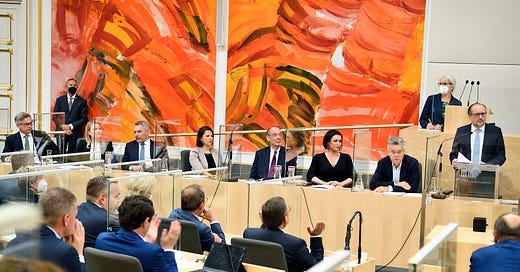Fallout
Austria has a new chancellor and a new budget. The government's work continues. The question is: For how much longer?
Servus!
The country has a new chancellor in Alexander Schallenberg, a new foreign minister in Michael Linhart, and a new head of the People’s Party (ÖVP) parliamentary party in Sebastian Kurz. It also has a new 3,400 page, 103.6 billion Euro budget, unveiled by finance minister Gernot Blümel in parliament last Wednesday, one featuring among other things more money for the environment ministry and 18.6 billion Euros worth of tax cuts over the course of the next few years. The crisis of government is over and its work goes on. But as I alluded to at the end of last week’s newsletter, the question remains: For how much longer?
In recent interviews, Schallenberg has insisted that the coalition and his time in the federal chancellery will continue until new elections are due in the fall of 2024. Yet at the same time, the new chancellor has acknowledged that the coalition is fragile, skating on thin ice, and there is work to be done in order to rebuild trust between the two parties—the ÖVP and the Greens—in the wake of the ‘advertising affair’ that led to Kurz’s resignation. Installing a new chancellor and passing the budget—including its ‘eco-social’ tax reform element of tremendous importance to the Greens—was a crucial first step in this regard, but it is only the first.
The distrust between the two parties at this point is mutual. The Greens only found out about the October 6 raids by anti-corruption authority (WKStA) investigators on the federal chancellery and ÖVP party headquarters through the media. Since the coalition was formed in early 2020, the Greens have had to tolerate not only the ÖVP’s hardline on immigration and their attacks on Austria’s institutions including the independent judiciary, but also the WKStA’s separate investigation into ties financial and political between the ÖVP, the international gambling giant Novomatic, and the partly state-owned casinos operator Casinos Austria.
In the scope of those investigations, Kurz came under suspicion concerning possible false statements made to the parliamentary investigative committee looking into the Ibiza affair, and indeed, any possible reconciliation between the ÖVP and the Greens is complicated by the fact that Kurz continues to hang around the political scene as ÖVP parliamentary party boss. His counterpart on the Green side, Sigi Maurer, is reportedly attempting to keep contact with her new co-worker to a minimum; whether that wish is feasible, and the extent to which Kurz can continue to exert influence over the coalition’s agenda, will become clearer in the coming weeks.
For its part, the ÖVP has not taken too kindly to the way vice-chancellor Werner Kogler conducted himself both before and after Kurz’s resignation, on the one hand because of the negotiations he was openly conducting with parliament’s opposition parties in the days prior—negotiations which raised the possibility of an alternative anti-ÖVP coalition—and on the other because of the victory lap he took in the press thereafter. Recollections, it seems, may very as to who it was that determined Kurz’s fate: the Greens, the governors of ÖVP-run states, or Kurz himself.
The contemporary political landscape in Austria is unstable and the underlying conditions are unsuited to another general election. Not enough people have been vaccinated against COVID-19, setting the stage for another winter wave. No party has the money in the bank to fight a third election campaign in five years—including and especially the ÖVP. New forces on the corona-skeptic far-right are on the rise. Both the ÖVP and the Greens, it may be argued, have an incentive to hold onto one another and wait out the storm together. If they let go, then the country would be bounced into an election that nobody wants and of which no one could predict the outcome.
Bis bald!
Thank you for signing up to the Vienna Briefing. If you know someone who would be interested in receiving this newsletter, consider sharing it with them today.
B. Arrested
The opinion pollster B. was arrested on Tuesday morning last week in connection with the ‘advertising affair’ which led to Sebastian Kurz resigning the chancellorship. B. was taken into custody and released by police 48 hours later. It is believed B. attempted to wipe her text message history and iCloud clean prior to investigators’ raids on the federal chancellery and ÖVP party headquarters on October 6. The presumption of innocene applies.
Kurz-NEOS Alliance?
In 2016, Kurz was involved in discussions with then-NEOS leader Matthias Strolz and presidential candidate Irmgard Griss about forming a new political movement, according to the pair. Griss said these conversations ended once it became clear Kurz was incapable of “emancipating himself” from the ÖVP.
Dead Refugees Found
Two refugees were found dead in the back of a minivan Tuesday during a vehicular search at the Austro-Hungarian border. The refugees were two of 30 attempting to make their way over the border in a vehicle driven by a people smuggler. Police continue to look for the driver who took flight during the search.




